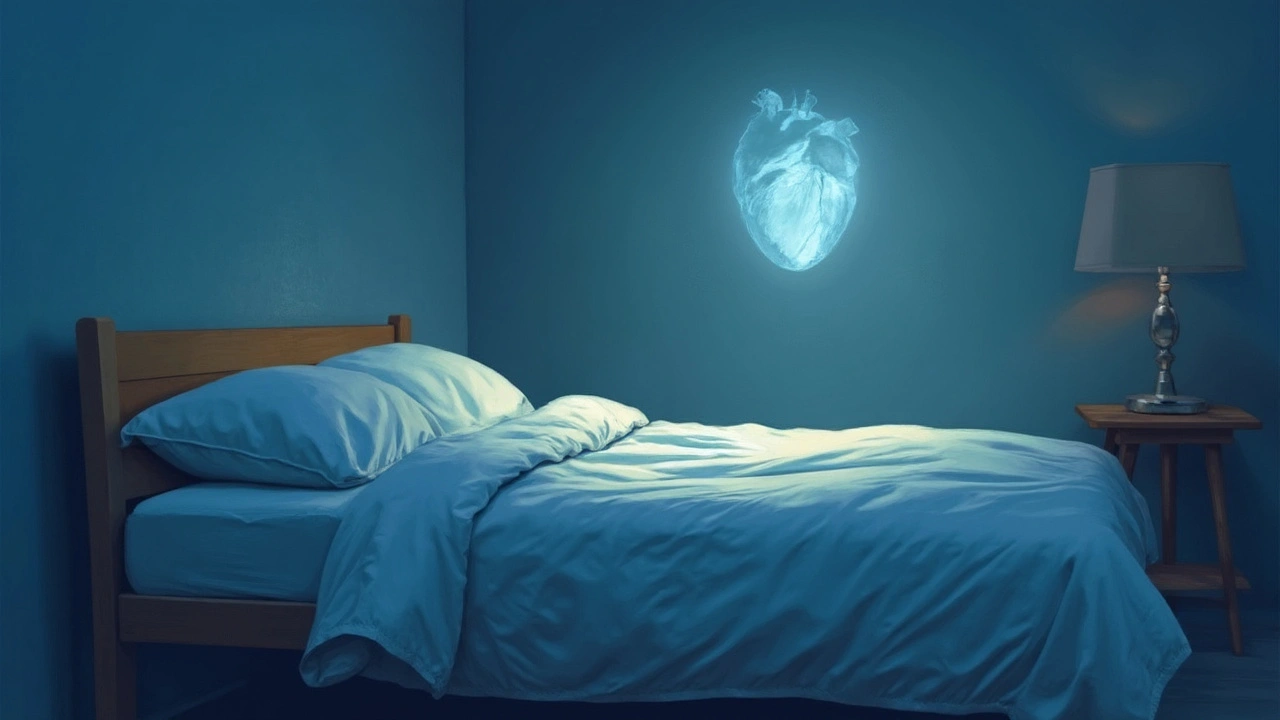If you've ever been prescribed isosorbide mononitrate for your heart, you might have noticed that your sleep feels a bit off. You're not alone. Many people aren't aware that this medication, while great for keeping those pesky chest pains at bay, can shake up your nightly routine.
So, why does this happen? Isosorbide mononitrate is primarily used to prevent chest pain (angina) by widening blood vessels and improving blood flow. But this same mechanism of action can sometimes lead to headaches, which could be keeping you up at night.
On top of headaches, some people experience dizziness or feel like their heart's racing, which obviously doesn't help when you're trying to catch some Z's. Understanding these side effects can help you and your doctor figure out the best way to handle them, ensuring your heart's happy and you're sleeping soundly.
- Understanding Isosorbide Mononitrate
- How It Can Affect Sleep
- Managing Side Effects
- When to Talk to Your Doctor
Understanding Isosorbide Mononitrate
Let's break down what isosorbide mononitrate is all about. It's mainly prescribed for folks dealing with heart-related issues, especially angina. Angina, as you might know, is that tight, squeezing pain in your chest caused by your heart not getting enough oxygen-rich blood. Not fun.
Isosorbide mononitrate belongs to a group of drugs called nitrates. Its job? To open up your blood vessels, making it easier for blood to flow and reducing your heart's workload. It doesn't stop an angina attack once it's started, but it helps prevent them.
Why Is It Important?
You might wonder why doctors choose this specific med. Well, compared to other nitrates, isosorbide mononitrate is long-acting. This means it stays in your system longer, providing extended relief. This is a big win for people needing continuous management of angina symptoms.
How Is It Taken?
Typically, it's taken once a day, often in the morning, as a tablet. Some versions are designed to be released slowly, ensuring consistent levels in your body all day. Always follow your doctor's instructions closely; they know best how this fits into your overall health plan.
An important detail is the need to maintain a nitrate-free interval, usually overnight, to prevent your body from getting too used to the drug. If it becomes too accustomed, the effectiveness might wear off, which is something you definitely don't want.
Understanding these aspects of isosorbide mononitrate helps make sense of its purpose and how it might play into other areas of your life, like sleep.
How It Can Affect Sleep
When it comes to isosorbide mononitrate, many people are more focused on its benefits for the heart rather than its potential impact on sleep. But the truth is, this medication can throw your sleep off-track. Let’s break down some common ways it might be affecting your nights.
Headaches and Restlessness
One of the main side effects of isosorbide mononitrate is headaches. These aren't your occasional tensions; these can be persistent and intense enough to make drifting off impossible. Plus, the medication might cause a feeling of restlessness due to blood vessels expanding, making your body feel out of sorts.
Dizziness and Racing Heart
Another notable effect is dizziness. It’s pretty common and can make you feel like the room's spinning, which is obviously not ideal when you're trying to sleep. Additionally, some folks report their heart feels like it's racing – again a result of those widened blood vessels. This can lead to a kind of anxiety that makes sleeping tough.
Tips to Improve Sleep
- Take isosorbide mononitrate at a time that minimizes nighttime discomfort. Discuss this with your doctor before making changes.
- Keep your bedroom cool and dark, creating a relaxing environment that supports natural sleep.
- Try a consistent sleep schedule. Sometimes sticking to a routine helps your body adjust better.
Statistics on Side Effects
Interesting fact: A clinical study observed that about 20% of patients taking isosorbide mononitrate reported sleep disturbances. For some, these changes were temporary as their bodies adapted to the medication.
Talking to your healthcare provider about these side effects and any sleep issues can help you find the right balance between treating your heart condition and getting a good night's rest.

Managing Side Effects
Dealing with side effects can be a drag, especially when you're just trying to look after your heart. When it comes to isosorbide mononitrate, a few straightforward strategies can help you manage these pesky issues and get back to feeling more like yourself.
Headaches and Dizziness
Headaches are a common sidekick to this medication. To ease them, over-the-counter pain relievers like ibuprofen or acetaminophen often help. Just double-check that they’re okay with any other meds you're on. Similarly, if you're feeling dizzy or lightheaded, it's wise to sit or lie down for a bit, and make sure to stay hydrated. Sudden moves can make dizziness worse, so take it easy on those quick hops out of bed!
"Understanding your medication and potential side effects can significantly reduce anxiety," says Dr. Sarah Thompson, a well-respected cardiologist in Toronto. "Discussing these with your healthcare provider ensures safer outcomes."
Sleep Disturbances
If sleep's become a hassle, consider the time of day you take your pill. Some folks find they sleep better when they take it earlier. Adjusting your medication schedule might be something you can discuss with your doctor.
General Lifestyle Tips
Living heart-healthy is beneficial beyond just reducing side effects. Here’s a quick hit list to keep things running smoothly:
- Maintain a balanced diet rich in fruits, veggies, and whole grains.
- Exercise regularly but check with your doc about what’s safe.
- Avoid alcohol or limit intake as it could worsen side effects.
- Stay consistent with your medication schedule.
Remember, always keep your healthcare provider in the loop. They can tweak your treatment if needed, ensuring you're both healthy and comfortable.
For those interested in quick insights, here’s a small breakdown:
| Side Effect | Potential Remedy |
|---|---|
| Headaches | OTC pain relievers |
| Dizziness | Rest, stay hydrated |
| Sleep Issues | Alter medication timing |
When to Talk to Your Doctor
If you're on isosorbide mononitrate and noticing it's throwing your sleep out of whack, it's probably time to have a chat with your doctor. You don't need to tough it out alone.
Recognizing When Sleep Disturbances Are More Serious
If headaches or dizziness become a nightly affair, or if you find yourself tossing and turning due to racing thoughts, these are pretty clear indicators that it's not just a passing phase. While mild side effects might fix themselves over time, persistent symptoms need some attention.
Questions to Ask Your Doctor
When you do talk to your doctor, be ready with questions. Here are some ideas:
- Is this reaction common with my medication?
- Would a different dosage help with my sleep issues?
- Are there alternative medications that might not affect my sleep?
- What can I do on a daily basis to reduce these side effects?
Keep a Sleep Diary
Before your appointment, consider keeping a sleep diary for a week or two. Note down your sleep patterns, disturbances, and how you're feeling emotionally. This can give your doctor a better picture of how isosorbide mononitrate might be affecting you specifically.
Be Open About All Symptoms
Don't just focus on sleep-related info. Tell your doctor about any other potential side effects too. It's possible they are related and could guide them towards a better treatment plan for you.
Your goal should be to balance your heart health with a good night's sleep. Staying open with your doctor could lead you to the answers you need. Remember, there's always room for adjustments when it comes to managing medications!






Ram Dwivedi
July 18, 2025 AT 15:24Hey folks! 🌟 Coming from someone who has done lots of reading about heart meds, I think this isosorbide mononitrate-sleep thing deserves some attention. It’s fascinating how a drug designed to protect the heart can ripple through your entire system, including your sleep.
The vasodilating effect, while opening your vessels, might meddle with your body's natural circadian rhythm. Some people might find it harder to drop off or get restful sleep because their blood pressure or heart rate shifts unexpectedly.
For those experiencing this, have you noticed if taking the medication at a certain time helps? I’ve read that evening dosing can sometimes be a culprit for insomnia, but early morning might ease that.
Also, lifestyle tweaks can be vital here—cutting caffeine, keeping a cool dark room, and avoiding screens before bedtime.
And of course, if sleep becomes a nightmare, that's definitely something to flag with your doc. It’s their job, after all, to balance the heart benefits with quality of life issues like sleep.
Hope this helps someone out there—never underestimate the power of quality sleep when managing heart health! 💖
Jocelyn Hansen
July 22, 2025 AT 20:44OH wow, this topic is SO important!!! I've worked with patients on heart meds before, and sleep disturbances totally throw them off!!! 😵💫
Sleep is like the secret weapon in healing and feeling good. When meds mess with it, folks can spiral into anxiety or depression which makes everything worse.
Anyone out here tried any non-medication helpers for sleep while on isosorbide mononitrate? Like weighted blankets, calming teas (after doc okayed), or meditation apps? I've seen some surprisingly good success stories and would LOVE to hear more!
And please, never suffer in silence if your sleep goes haywire — scream to your healthcare peeps until they're forced to fix it!!! Your well-being matters so much!!!
Let's keep this convo going! Sharing ways to support each other through this is what counts! 😉💪🏽
rahul s
July 27, 2025 AT 15:04Frankly, I think everyone needs to understand what they’re putting into their bodies instead of blindly following prescriptions. Isosorbide mononitrate is not just a wonder pill that fixes heart issues; it has complex physiological implications that honestly can shake up your entire system.
The sleep side effects are not some minor inconvenience — they can degrade your cognitive functions, mood, and overall quality of life.
I throw down the gauntlet: if your doctor just shrug off your sleep complaints, get a second opinion or dare to question the prescribed regimen. The medicine's impact must be transparently discussed!
Also, consider your diet and mental health because these factors might exaggerate the side effects.
Plus, let’s not forget that national health policies need to crank up patient education about medications like this, yes?
Julie Sook-Man Chan
August 2, 2025 AT 06:04I appreciate all these perspectives shared here.
From my experience, some patients have reported vivid dreams or even a mild sense of restlessness after taking isosorbide mononitrate, which directly impacts their ability to achieve deep restorative sleep.
It seems prudent to monitor such sleep disturbances closely and maintain regular logs to present during medical consultations.
Collaboration with one’s healthcare provider is essential; adjustments in dosage or timing might offer relief.
Integrating behavioral therapies or relaxation techniques might also serve as adjuncts to improve sleep quality.
Ultimately, every patient's response is unique and must be respected as such.
Amanda Mooney
August 6, 2025 AT 06:57It is paramount to underscore the considerable influence that isosorbide mononitrate may exert on patients' sleep architecture.
The pharmacodynamics and pharmacokinetics of the medication necessitate thoughtful timing to mitigate sleep disruption.
Patients ought to engage in candid dialogues with their cardiologists and pharmacists to tailor their therapeutic regimens responsibly.
Moreover, incorporating evidence-based practices such as sleep hygiene education should be institutionalized in patient care protocols.
Let us all advocate for patient empowerment through knowledge and proactive management strategies, to not only prolong life but also enhance its quality.
Mandie Scrivens
August 10, 2025 AT 06:37Ah, yes, the infamous 'sleep disturbance' trope with cardiac meds — never *quite* as innocent as they say.
The irony is ripe: a drug that stretches your vessels might just squeeze your ability to sleep. What a thrilling paradox! 🙄
Seriously though, if your doctor just writes this off like it’s no big deal, press harder. This is YOUR body, not a mere test tube.
And the whole 'lifestyle tips' bandwagon? Please, save that for the brochures. We need concrete medical solutions, not just tea and chamomile suggestions.
Sleep is not a luxury; it’s an essential function. Meds that cripple it deserve scrutiny, not a casual shrug.
Natasha Beynon
August 12, 2025 AT 08:57I think there’s a balance to strike here.
While some may find sleep disturbed by this medication, others tolerate it quite well.
That variability calls for compassionate, individualized care rather than blanket skepticism.
Helping patients find the best timing, encouraging mindfulness, and optimizing their environment can ease challenges.
But certainly, any persistent troubling symptoms should be evaluated medically.
It's not always a one-size-fits-all, and understanding that nuance is key.
Cinder Rothschild
August 14, 2025 AT 11:17Reading through these comments, it’s striking how much this topic invites varied experiences and emotions.
Sleep, especially for those managing chronic conditions, is a fundamental pillar that supports every waking moment.
It’s no wonder that disruptions tear through the fabric of daily life so thoroughly.
I also wonder about the cultural factors influencing how people perceive medicine side effects and communicate with their healthcare providers.
Sometimes, a gentle nudge towards assertive advocacy for one’s health can make a remarkable difference.
Overall, openness, patience, and education seem to be the best tools in this complex landscape.
Oscar Brown
August 16, 2025 AT 11:27It behooves us to analyze this subject from the standpoint of clinical pharmacology with a rigorous and meticulous scrutiny.
The interference of isosorbide mononitrate with sleep patterns is likely a consequence of its hemodynamic effects and neurochemical modulation.
Alterations in nocturnal blood pressure and the potential induction of arousal states could account for the observed insomnia reports.
I would recommend a formal polysomnographic evaluation in persistent cases to elucidate the precise nature and extent of sleep disruption.
The interplay between cardiovascular therapeutics and circadian physiology presents a fertile ground for further scholarly inquiry.
Alex Feseto
August 17, 2025 AT 13:21In my considered opinion, those who suffer sleep disturbances when medicated with isosorbide mononitrate must be treated with utmost seriousness.
Such perturbations in the natural order of sleep can detrimentally affect prognosis.
The finer nuances of dosing schedules, patient lifestyle, and concurrent medications must be explored thoroughly.
It is imperative that clinicians embrace a holistic assessment to preempt the deleterious consequences of suboptimal rest.
Indeed, the art and science of medicine converge in such complex scenarios.
vedant menghare
August 17, 2025 AT 15:24This discussion reverberates with my own reflections on how pharmacological interventions ripple through the symphony of human physiology.
The pathos of disturbed sleep in the context of heart medications is not to be understated; it echoes beyond the immediate physiological realm into the existential.
One might contemplate the delicate dance between drug efficacy and the intangible quality of life, such as sleep, which is often overshadowed.
Perhaps a more integrative approach embracing not only biochemical pathways but also patient narratives could illuminate pathways to optimal therapeutic harmony.
In this complex interplay, listening deeply to patients’ experiences must be as sacrosanct as measuring clinical endpoints.